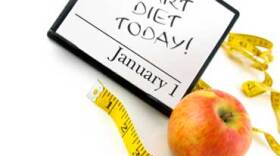Did you eat your Wheaties this morning? Have an Incredible, Edible Egg? Roll your eyes if you must, but more and more research is supporting the old saying that breakfast is the most important meal of the day.
The American Diabetes Association reports that, as its name implies, the purpose of breakfast is to break the fast between dinner and lunch. Here's what happens when you don't eat a morning meal: Your body enters into a prolonged fasting state. It starts to believe that you won't be eating any time soon so when you do eat, your body stores it as fat in case the next meal is a long time coming as well. That, of course, leads to weight gain.
Consumer Reports states that breakfast eaters tend to have better diets overall, consuming more fruit, vegetables, milk, and whole grains than non-breakfast eaters.
Yet, 10% of Americans skip breakfast! The American Academy of Pediatrics estimates that by the time kids enter adolescence, as many as 20 to 30 percent of them have completely given up the morning meal. Of course, a doughnut on the way out the door doesn’t really count as a healthy breakfast.
Johns Hopkins Bloomberg School of Public Health suggests planning ahead to make sure you have time for a healthy breakfast every day. Before you go to sleep, plan what you will eat in the morning, setting out the cereal box to remind yourself if necessary. Set your alarm for 15 minutes earlier so you have time to enjoy a breakfast that contains elements from the grain, dairy and fruit or vegetable food groups. You’ll reduce the mid-day energy slump and the temptation to snack on sugary treats or overeat at your next meal.
Websites:
http://www.diabetesforecast.org/2011/sep/the-importance-of-breakfast.html
http://www.consumerreports.org/cro/magazine/2014/10/why-eating-the-right-breakfast-is-so-important/index.htm
https://www.healthychildren.org/English/healthy-living/nutrition/Pages/The-Case-for-Eating-Breakfast.aspx
http://www.jhsph.edu/offices-and-services/student-affairs/_documents/Breakfast






